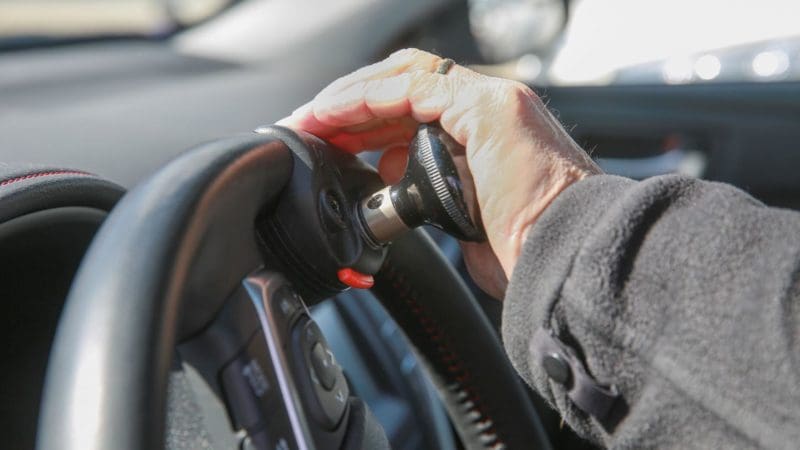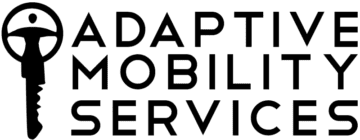
What is Adaptive Driving Training
A person’s ability to drive gives them the freedom and flexibility to care for themselves and to make meaningful connections with friends, family, and resources. When illness or injury takes away that ability, adaptive driving training can give drivers the skills and confidence to get back on the road. In this post, we meet Elaine, a client who returned to driving after losing her right leg in an accident – and we learn where she plans to go on her first solo car trip.
What is Adaptive Driving Training?
Adaptive driving training includes a comprehensive driving evaluation and rehabilitation services. The in-vehicle driver assessment is an opportunity to observe driving potential for the client. Outcomes are shared with the client and their family so that a decision can be made regarding the appropriate course of action.
Clients may then receive behind-the-wheel instruction, learning how to use adaptive driving equipment such as a left-food acceleration pedal, hand controls, and steering devices. With the help of an occupational therapy (OT) driver rehabilitation specialist, clients also obtain the skills needed to pass a motor vehicle department driving licensing exam.
Why is Adaptive Driving Training Important?
The Bureau of Transportation Statistics report on Travel Patterns of American Adults with Disabilities estimates that 25.5 million Americans have disabilities that make traveling difficult and more than half of these persons are in the age category of high labor force participation.
Adaptive driving training can give back independence to drivers who have been challenged with an injury or illness. They gain new skills and the confidence to help themselves. Along with the clients, family members and caregivers also experience the reassurance that comes with knowing their loved one is equipped with the resources and skills to drive safely.
Occupational therapists who receive OT-specific training, which includes an online clinic as well as behind-the-wheel training, are able to provide another level of guidance and support for their clients. By working together, the skilled OT driver rehabilitation specialist can help clients save time and money by matching their individual skills to the best equipment.
Meet Elaine
Elaine lost her right leg in an accident and was unable to drive. During that time, she had to rely on others to transport her to appointments and to run errands, often waiting for rides for long periods of time. “I was worried that I wouldn’t be able to drive again, and driving means freedom to me,” Elaine said. Without the ability to drive, she lost her independence.
Elaine received training to pass her driver’s test, and her vehicle was fitted with a left foot acceleration device. Now she can drive herself to appointments, to the library, to pick up supplies for her garden, even to get pizza. “I feel like I’ve gotten out of prison,” she said. Being able to drive gives her freedom, flexibility, autonomy, and spontaneity, all of which she lost during the time she could not drive herself.
From the moment she contacted Adaptive Mobility, Elaine said she felt welcomed and valued. In addition to evaluation and training, Adaptive Mobility helped her schedule her driver exam with the motor vehicle department. She said she could have done that on her own but had been putting it off. “That kind of hospitality…is so critical for people who have felt a burden for a while,” she said.
She says her first road-trip will be to Rakestraw’s Ice Cream in Mechanicsburg, where she plans to order the butter brickle. “They have some of the best ice cream in the world.”
Watch Elaine and Susie’s conversation, which occurred just after Elaine had passed her driving exam.
Get Back on the Road
For clients like Elaine, a return to driving opens a new world of possibilities that had previously been unavailable or difficult to find. Adaptive driving training provides training and equipment, but more importantly, it gives clients confidence and the joy that comes with being able to care for themselves.
Specialized adaptive driving certification and mentorship training programs help occupational therapists change clients’ lives by restoring their freedom and mobility.
Want to Learn More?
Learn more about a driving risk assessment, driver rehabilitation, and adaptive equipment on the Adaptive Mobility Services website. Contact Susie Touchinsky at susie@adaptivemobility.com or call 484-650-2280 to schedule an appointment.
If you are an occupational therapist interested in providing adaptive driving training to clients, contact Susie and also join us on Facebook: Driving Rehab for the OT.
Interested in learning more about adaptive equipment? Check out this video.
Meet Susie!

Susie Touchinsky, OTR/L, SCDCM, CDRS, is an established expert in both occupational therapy and driver rehabilitation. She has been an OT for more than 20 years and brings expertise and a love for helping others in her speeches and trainings.
Learn More With Our OT Driver Rehabilitation Specialist Courses
Try Our Free OT DRS Courses:
- OTs Role With Driving
- GRID: Generalist Resource to Integrate Driving
- Readiness to Drive: IADL Checklist
- FREE 6 Driving Resources for the OT
- 5-Steps Our Clients Use to Start Their Own Highly-Paid OT Driver Rehab Business
- Driving Risk Screening Tools
- BCAT Brief Cognitive Assessment Test System Overview
- BCAT Part 2: CBS 8 & 15-for-Me
Become the best OT Driver Rehabilitation Specialist you can be by being a life long learner.
